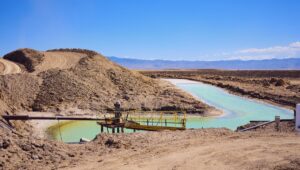Latest News From D Block Metals

New Super Material Featuring Indium and Tantalum Disulfide
Even more groundbreaking, this material also exhibits superconductivity with the ability to conduct electricity with zero resistance.

Lithium’s $1.5 Trillion Opportunity in the U.S.
With an estimated value of $1.5 trillion and the potential to yield up to 40 million metric tons of lithium, this volcanic deposit is being hailed as one of the largest in the world.

What the New Cu-Ta-Li Alloy Means for Tantalum Recyclers
Through nanostructuring and an innovative complexion-stabilized precipitate design, the researchers have created a material that maintains mechanical strength and structural stability under extreme heat and stress.
Purpose
The purpose of this document is to define the policy used by D Block Metals, LLC. to support transparency of our Supply Chain and to set up long lasting relationships with our suppliers.
Scope
This policy outlines the goals, avoidances, and penalties that D Block Metals uses to ensure that none of our minerals are responsibly sourced and not sourced from Conflict-Affected and High-Risk areas.
Policy
D Block Metals takes our responsibility seriously for the environment, our employees, our local community, and the global community. Since we began operation in January 2012, we have fully supported the position of the Responsible Business Alliance (RBA); formerly EICC (Electronic Industry Citizenship Coalition), the Global e-Sustainability Initiative (GeSI), and the Tantalum-Niobium International Study Center (TIC)
To promote and ensure the exclusive use of responsibly sourced tantalum, D Block Metals commits to:
- OECD (Organization for Economic Cooperation and Development) Due Diligence Guidance for Responsible supply Chains of Minerals from Conflict-Affected and High-Risk Areas to set up processes avoiding the use of minerals sourced from conflict regions that may facilitate serious human rights abuses such as any forms of torture, cruel, inhuman and degrading treatment, forced labor or child labor, sexual violence, war crimes or other serious crimes against humanity or genocide.
- Strictly adhering to the guidelines set forth in the Dodd-Frank Act as well as Regulation (EU) 2017/821 as they directly influence our policies concerning sourcing of minerals.
- Communicating our sourcing policies to all suppliers regarding our requirements pertaining, but not limited to; serious human rights abuses associated with the extraction, transport, or trade of minerals; zero-tolerance of support to non-state armed groups (including public or private security forces); zero-tolerance of bribery or fraudulent distortion of the origins of minerals; and zero-tolerance of money laundering and payments of taxes, fees, or royalties to any party other than the host government. If any upstream supplier is found to be performing any of the activities, D Block Metals will immediately suspend and/or end its engagement with said entity.
-
- Our suppliers are expected to conduct their own due diligence on the matters mentioned above per RMI/RMAP standards. This is communicated by sharing our policy with all new suppliers and including our policy in our purchasing documents.
- Continued cooperation with the RBA’s Responsible Mineral Initiative (RMI) through Responsible Minerals Assessment Process (RMAP).
- Establishing policies to ensure we adhere to international transportation regulations for class-7 materials and only buy materials from companies who objectively prove compliance with the guidelines.
D Block Metals Company Policies & Reports
Policy
Conflict Minerals
The purpose of this document is to define the policy of the management of D Block Metals has adopted with respect to the use of Conflict Free Minerals.
Policy
Conflict Minerals Grievance
The purpose of this document is to outline the process to note incidents and file grievances with D Block Metals, LLC. pertaining to our Responsible Minerals Initiative (RMI).
Report
Conflict Minerals Due Diligence
D Block Metals is committed to compliance to the guidelines set forth in the Responsible Minerals Assurance Process (RMAP).
Latest News From D Block Metals

New Super Material Featuring Indium and Tantalum Disulfide
Even more groundbreaking, this material also exhibits superconductivity with the ability to conduct electricity with zero resistance.

Lithium’s $1.5 Trillion Opportunity in the U.S.
With an estimated value of $1.5 trillion and the potential to yield up to 40 million metric tons of lithium, this volcanic deposit is being hailed as one of the largest in the world.

What the New Cu-Ta-Li Alloy Means for Tantalum Recyclers
Through nanostructuring and an innovative complexion-stabilized precipitate design, the researchers have created a material that maintains mechanical strength and structural stability under extreme heat and stress.
